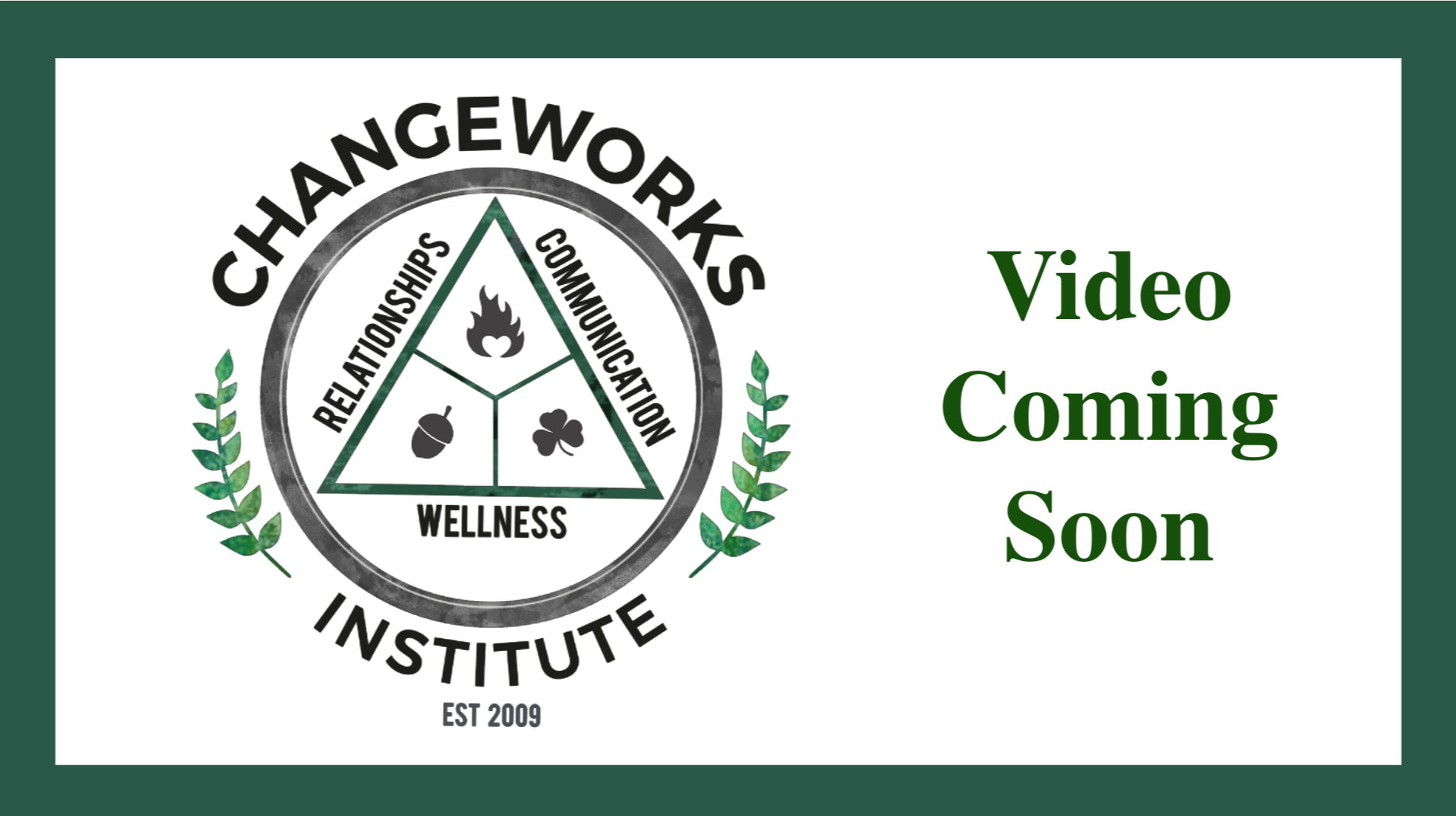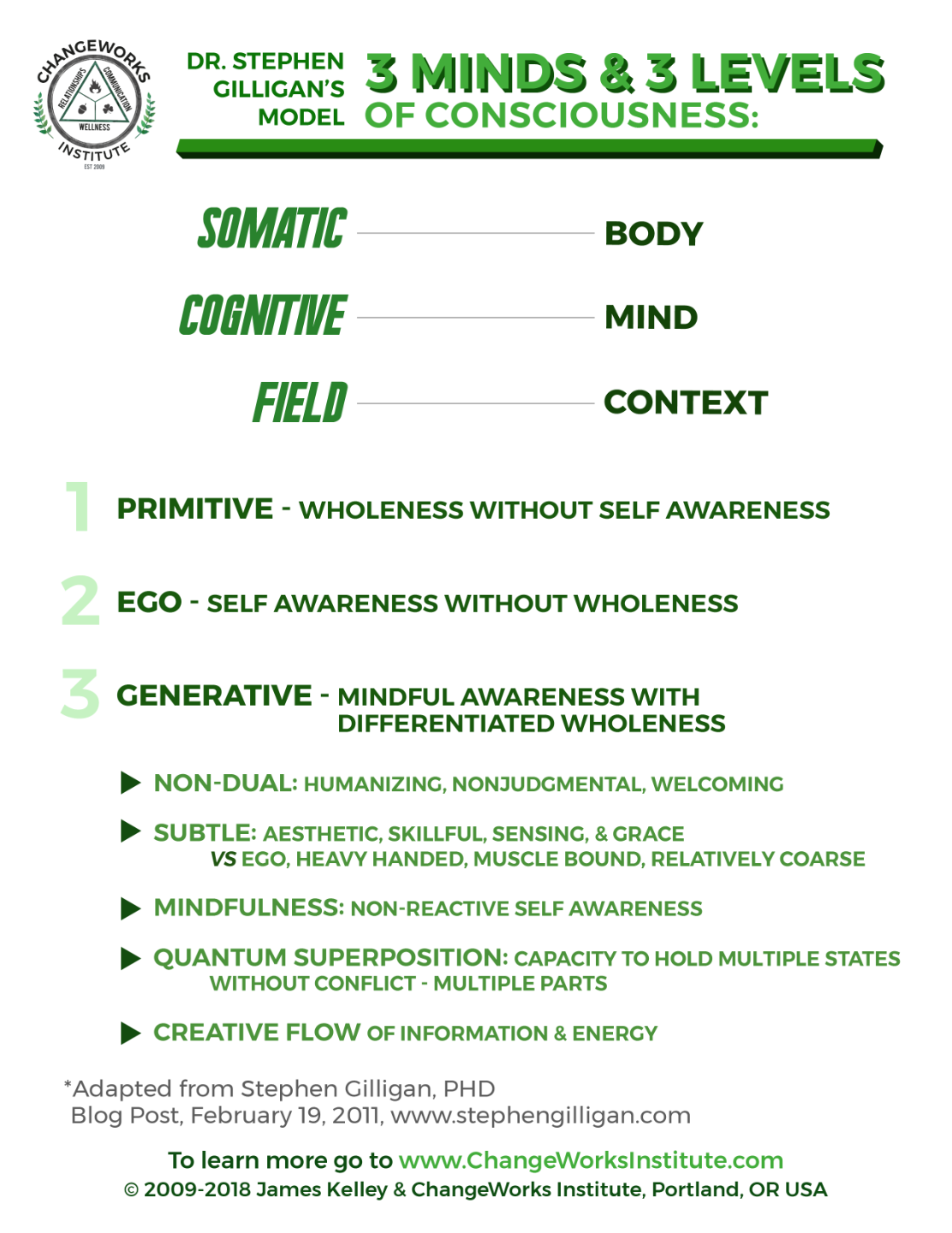Stephen Gilligan PhD
“When deciding what to do next, we can always ask: Does this thought, emotion, or behavior bring me closer to or take me further away from my center?”
Influence on SDC Framework Focus
Gilligan’s insight that meaningful change begins from within and is strengthened through coaching and therapy aligns closely with the principles of Self Directed Change (SDC).
Back in February 2011, Dr. Stephen Gilligan wrote a blog post that continues to shape our approach to self-directed change today. In his blog post, he lays out a powerful model of consciousness that includes three distinct levels: somatic, cognitive, and field. Each of these levels corresponds to a different way the mind operates: primitive, egoic, and generative.
Gilligan describes the generative mind as having “mindful awareness with differentiated wholeness.” In practical terms, this means it embodies a deep, non-dual awareness that is subtle, non-reactive, and fully present. It allows for self-awareness while holding multiple perspectives, multiple states, and even seemingly opposing parts, without conflict. The result? A creative and fluid exchange of energy and information that drives transformation.
His framework became a cornerstone of SDC, forming the basis for "The Evolution of the Trained Mind," a key element of the SDC Frameworks. The 3 Minds & 3 Levels of Consciousness model aligns seamlessly with SDC’s insights on self-efficacy, positive self-regard, and the freedom that comes from transcending, reactive, limiting states of consciousness. This work gives lifelong learners a roadmap to abide in states of gratitude, love, hope, peace, and joy. These are the essential qualities of whole-hearted living.
For a deeper dive into this model, check out the 3 Minds & 3 Levels of Consciousness poster and presentation in the Structure of Experience section of the ChangeWorks Collection. Find it here.
Want to go even further? Add Dr. Gilligan’s books to your library. His bestsellers: Therapeutic Trances: The Cooperation Principle in Ericksonian Hypnotherapy, The Courage to Love: Principles and Practices of Self-Relations Psychotherapy, offer profound insights into transformation and personal mastery. Find them here in the ChangeWorks Bookstore.

Key Contributions and Concepts
Dr. Steven Gilligan is a psychotherapist who developed self-relations psychotherapy and generative therapy, which focus on accessing inner resources, fostering self-compassion, and cultivating creativity. His approaches reframe therapy as a process of collaboration and co-creation, that focus on personal growth potential and the importance of integrating multiple levels of consciousness.
A student of Milton Erickson, Gilligan’s approaches expand on Ericksonian principles by integrating them with humanistic psychology, somatic practices, and Eastern mindfulness traditions. In his approach, the mind and body are interconnected. Working with disturbances to this connection can promote healing and transformation.
Self-Relations Therapy
Self-relations therapy (SRT) is based on the importance of building a compassionate relationship with oneself. The core premise is that psychological struggles often stem from an adversarial or disconnected relationship between different parts of the self. Healing involves nurturing supportive, integrative self-talk that promotes self-acceptance and creativity.
SRT proposes that people have three levels of consciousness:
- Somatic consciousness, which is rooted in the body’s felt sense and emotional experiences.
- Cognitive consciousness, the rational and analytical aspect of the mind.
- Field consciousness, which represents relational and environmental awareness.
In Gilligan’s approach, psychological well-being depends on harmony among these levels. When they are misaligned or in conflict, individuals may experience symptoms of distress or dysfunction.
Self-compassion is important in SRT. Clients are encouraged to approach their inner world with curiosity and kindness, even when encountering painful emotions or challenging aspects of themselves. By transforming self-criticism into self-support, SRT helps individuals access their resilience and resourcefulness.
Trance states are viewed in SRT as natural states of consciousness where healing and creativity can occur. These states are used to bypass habitual patterns of thought and access deeper layers of experience, allowing clients to connect with their inner wisdom.
Generative Therapy
Generative therapy builds on the foundations of self-relations therapy. SRT focuses on self-acceptance and integration, while generative therapy focuses on creativity, flow, and the co-creation of solutions to challenges.
In generative therapy, the co-creation of the relational field between the therapist and the client is an important part of therapy. The therapist acts as a guide and sponsor, supporting the client in accessing their inner resources while maintaining a sense of partnership and collaboration.
Generative therapy is based on the concept of the generative state—a state of openness, mindfulness, and resourcefulness that allows individuals to transcend limiting patterns and access their creative potential. These states are cultivated through techniques like guided visualization, somatic awareness, and focused attention, which help clients to connect with their values and intentions.
One of the defining features of generative therapy is its focus on positive intention. Challenges, symptoms, and even negative emotions are viewed as signals of deeper needs or opportunities for growth. Therapy helps clients explore these experiences with curiosity and transform them into sources of strength and creativity.
Like SRT, generative therapy emphasizes the mind-body connection. Gilligan encourages clients to connect realizations to a felt sense in the body, that is, to anchor insights and changes in their physical experience, making transformation more tangible and sustainable.
Creative Consciousness and the Generative Self
Creative consciousness and the generative self are interconnected concepts developed by Stephen Gilligan that emphasize the role of creativity in personal transformation and well-being. Creative consciousness refers to the ability to connect with all parts within oneself and creatively interrelate with the systems around us, including communities, family, and environment. The generative self is the aspect of identity that can create new realities and possibilities. These concepts are based on the idea that consciousness is the creator of reality, operating through various filters or "minds" such as the cognitive, somatic, and field minds.
Centering
Stephen Gilligan defines centering as the ability to be both part of and apart from an experience, allowing for vulnerability and new learning.
Creative Acceptance
Gilligan redefines acceptance as an active curiosity about what something might become if accepted.
Biography
Stephen Gilligan was born December 26, 1954. He grew up in San Francisco and lived in a strict Catholic Household where he suffered abuse. He noticed, even as a child, that what people said often didn’t match what he observed in them, which inspired him to study psychology.
Biography
Stephen Gilligan was born December 26, 1954. He grew up in San Francisco and lived in a strict Catholic Household where he suffered abuse. He noticed, even as a child, that what people said often didn’t match what he observed in them, which inspired him to study psychology.
Gilligan was part of what’s known today as the original Neuro Linguistic Programming cohort, loosely associated with UC Santa Cruz, where he studied Gestalt and “meta-model” therapy with NLP co-creators Richard Bandler & John Grinder.
Interdisciplinary thinker Gregory Bateson, faculty of Kresge College at the University of California, Santa Cruz, introduced Bandler, Grinder, and Gilligan to the renowned psychiatrist Dr Milton Erickson. Gilligan later received a PhD from Stanford University and became one of the foremost teachers and practitioners of Ericksonian hypnotherapy.
He also developed self-relations psychotherapy, and generative psychotherapy. In 2004, he received the rarely given Lifetime Achievement Award from the Erickson Foundation in honor of his many achievements.
Gilligan is married and lives in Encinitas, California where he continues to develop generative change work, which includes the applications of generative coaching, generative psychotherapy, generative trance, hero’s journey, and systemic change work.

Book Store
Therapeutic Trances: The Cooperation Principle in Ericksonian Hypnotherapy (1987; New York: Brunner/Mazel)
- This book explores Gilligan's early work on Ericksonian hypnotherapy, emphasizing the cooperative nature of the therapeutic relationship.
The Courage to Love: Principles and Practices of Self-Relations Psychotherapy (1997; New York: W. W.Norton)
- A seminal work introducing self-relations psychotherapy, outlining its principles and practical applications.
The Hero's Journey: A Voyage of Self-Discovery (2009; Wales: Crown House Publishing)
- Co-authored with Robert Dilts, this book applies the hero's journey concept to personal growth and transformation.
Generative Trance: The Experience of Creative Flow (2012; Cardiff, Wales: Crown House Books)
- This work introduces the concept of generative trance, presenting a new approach to utilizing altered states for personal development.
Generative Coaching, Volumes 1, The Journey of Creative and Sustainable Change (2021; International Assoc. for Generative Change)
- Co-authored with Robert Dilts, the volume presents the principles and practices of generative coaching.
Generative Coaching, Volumes 2, Enriching the Steps to Creative and Sustainable Change (2022; International Assoc. for Generative Change)
- Co-authored with Robert Dilts, the volume presents a more advanced version of the principles and practices of generative coaching.
Generative Coaching, Volumes 3, Multiple Levels of Creating Success (2022; International Assoc. for Generative Change)
- Co-authored with Stephen Gilligan. Explores the integration of NLP with generative change principles in coaching contexts.


